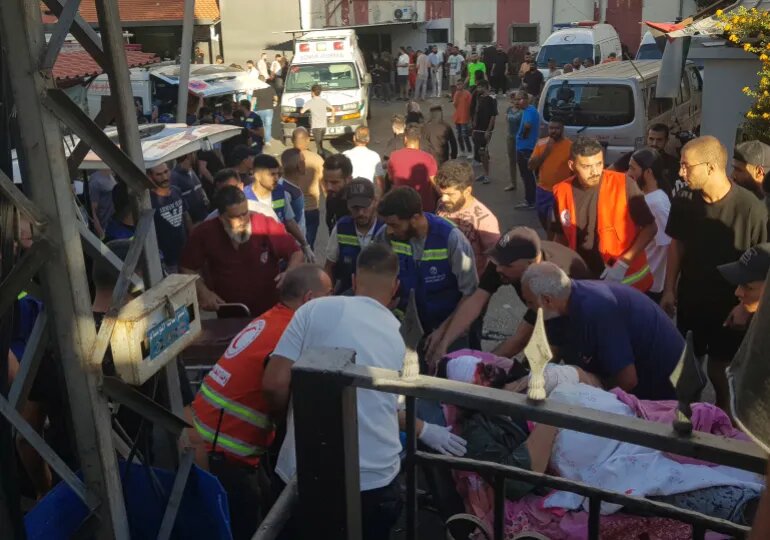The right to mutilate is employed to suppress resistance to settler colonialism

MADRID - Explosions of pagers associated with Hezbollah members rocked Lebanon on Tuesday, according to the Lebanese Ministry of Health. The attack resulte in 12 deaths and thousands of injuries, with 200 reported to be in critical condition. Suspicions point towards a possible terrorist act perpetrated by Israel.
The detonations occurred in multiple locations, including the capital city of Beirut, the southern city of Tyre, and the western region of Hermel. Social media circulated images of injured individuals with bloodied ears, faces, or pockets being rushed to the hospital.
Iranian Ambassador to Lebanon, Mojtaba Amani, was also injured in the attack. The embassy has reported that his condition is stable and he has been transferred to Al-Rassoul Hospital in Beirut.
While some media outlets attempt to exclusively link the detonated pagers to Hezbollah, several local sources suggest that the attack targeted a commonly used pager model, affecting civilians indiscriminately. Consequently, numerous healthcare workers, teachers, and children sustained varying degrees of injury.
This indiscriminate nature of the attack contrasts sharply with the enthusiastic descriptions from some U.S. media, such as CBS and CNN, which have praised the “incredible operation.” This disparity highlights the minimal consideration given to non-white and/or Muslim lives. Politically, it underscores how modernity’s machinery perpetuates a cycle of inclusion and exclusion, where international law and human rights collapse at the divide between those deemed “human” and those who are not.
Lebanese journalist Séamus Malekafzali remarks, “Despite all the propaganda about Israel being a center of innovation, the only true innovation from Israel has been in the field of terror: blowing up hotels, hijacking civilian planes, bombing passenger aircraft, using lethal drones, and now, exploding phones and pagers.” Israel’s primary export appears to be death and mutilation.
It is worth noting that in June, Israeli Lieutenant Colonel Yaron Buskila discussed the need to attack civilian infrastructure in Lebanon to “pressure Hezbollah.” This reinforces the conclusion that the conflict with Israel, due to its genocidal nature that disregards laws and rules, cannot be managed diplomatically or with low intensity. Its only language is force, and it is the only grammar it understands when turned against itself.
According to several cybersecurity experts, it is unlikely that the pagers used in the recent attacks in Lebanon were "hacked" remotely. Instead, they suggest that explosives may have been planted in the devices before delivery and could have been activated by some type of pulse, signal, or code sent to the pagers. Lebanese security sources indicate that the explosive devices were imported five months ago and implanted with 20 grams of explosive material.
The Taiwanese manufacturer of the pagers involved in the recent explosions, Gold Apollo, asserts that the devices in question were actually produced by a European company licensed to use their brand. According to various reports, this company is BAC Consulting based in Budapest, Hungary. Some sources speculate that BAC Consulting might serve as a front for Israeli terrorist activities.
From an ethical and political standpoint, the mere debate over whether the attack was a “stroke of genius” highlights a profound dehumanization of the Lebanese victims. This discourse overlooks decades of occupation, murder, torture, and mutilation perpetrated by Israel.
As Jasbir Puar explores in her seminal book The Right to Maim, mutilation can be a fate worse than death. Puar examines how "debilitation"—distinct from disability, which she views as an identity—is deliberately inflicted upon marginalized populations. Debilitation, or sometimes the slow death of these individuals, serves as a means to dispose of a population marked as "Other," dehumanized to the extent that inflicted harm is seen as a "natural" byproduct. As Puar notes, the dehumanization is so extreme that “[i]t is as if withholding death—refusing to let or make die—becomes an act of dehumanization [in itself]: Palestinians are not even human enough to die.”
This analysis also has a material dimension. If roads are impassable due to rubble, if healthcare systems are collapsing due to constant attacks, if the population faces starvation, lacks public hygiene, and is deprived of painkillers, anesthetics, and dressings, they will be thoroughly debilitated, even if there are no immediate physical or mental injuries.
Lena Obermaier, analyzing the situation in Palestine through Puar’s framework, explains that violence against the Palestinian (or Lebanese) population essentially functions as a form of advertisement for new Israeli military technology, which sees a boost in sales during and after conflict escalations.
Obermaier also discusses the "broken bones" policy implemented by Israel during the First Intifada under then-Defense Minister Yitzhak Rabin. Palestinian Wael Joudeh described it as: “They beat us with all their energy. They not only wanted to break our bones and inflict physical pain, they also wanted to humiliate us and shatter our spirit.” The same article recounts the story of Khadija Abu Shreifa, who defended herself against an Israeli soldier sexually harassing young Palestinian girls at a protest. As a result, she was beaten and shot at close range in the shoulder and foot, leaving her permanently debilitated.
This analysis frames the recent large-scale attack in Lebanon by Israel. Just as in Palestine, all civilians are marked as complicit and are no longer considered "innocent." They are all seen as militant resistance against Israel. Therefore, the right to mutilate is employed to suppress any resistance to Israeli settler colonialism and its ethnic cleansing agenda.
